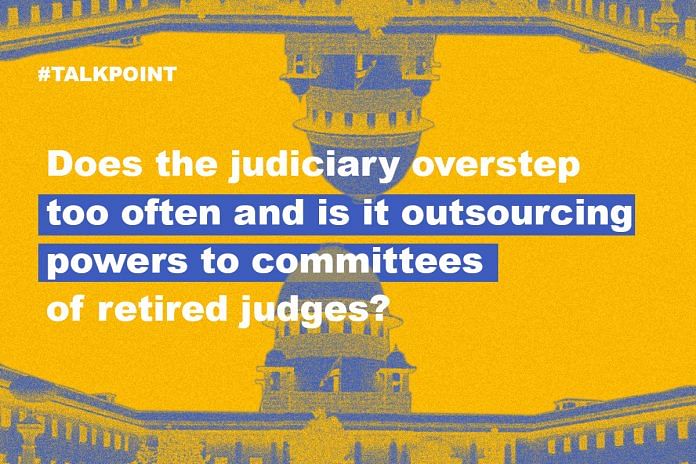Three significant comments made this weekend reignited the debate about separation between the judiciary and the executive.
President Ram Nath Kovind cautioned that the judiciary, the executive, and the legislature “need to be careful not to cross into each other’s finely-defined spaces. Or give the opportunity to read transgressions even when none is intended“.
Prime Minister Narendra Modi said “the balance between the legislature, judiciary, and executive has been the backbone of our Constitution. Because of this balance, our nation was able to defeat Emergency… we have to fulfil the people’s hopes and aspirations while remaining within our limits”.
Chief Justice Dipak Misra said “there is a perception that there is judicial activism”, adding that “there is no desire to enter policy making”.
ThePrint asks experts: Is the judiciary stepping into executive domain too often and outsourcing its powers to committees of retired judges?
Most certainly, the judiciary is walking too often in the executive space now. So, the debate is on whether it is doing the wise thing. I respectfully beg to say, no, My Lords, not at all.
You might think, with the best of intentions, that you are filling in where the executive isn’t doing its job. But the courts do not have the ability, space, time, or powers to perform another institution’s role. The courts cannot govern like the executive, and cannot make laws like the legislature.
The judiciary’s primary role is three-fold. One, to make sure that the laws enacted are faithful to the Constitution; two, that the executive follows these; and three, to protect every citizen’s constitutional rights.
The judicial mind should surely be creative and innovative. But not in a way that justifies outlandish interventions: a takeover of cricket, for example. In two months, it will be a year since a court-appointed, empowered committee is running the BCCI, with no retreat in sight.
Here are other sharp perspectives on judicial overreach:
Alok Prasanna Kumar, Senior Resident Fellow at Vidhi Centre for Legal Policy
Faizan Mustafa, Vice-Chancellor, NALSAR University of Law
Sanjay Hegde, senior advocate at the Supreme Court
This is as uncalled for as the court’s earlier takeover of the Medical Council of India. It ended in ignominy that we citizens do not want inflicted on our Supreme Court. The executive cancelled 32 medical college licences issued by the court-appointed committee, which dismantled itself quietly. The implication to a treasonable mind would be that the clearances were wrong (I am not suggesting mala fide), and that the executive took the right call.
This isn’t a script the honourable court would have imagined when it set up an empowered committee under a reputed retired CJI to clean up the MCI. Note the issue that most recently rocked and divided the bench, involving corruption charges for a medical college entrance.
Sitting in the country’s top courts with enormous powers, it is important to remember while no institution is perfect, one can’t start fixing problems in the other.
Just last weekend, prime minister Narendra Modi and finance minister Arun Jaitley (an eminent lawyer) highlighted this issue. I am in agreement with the criticism that courts should minimise setting up committees of retired judges and outsourcing their own powers to them. This creates a state of no accountability. A judicially-mandated travesty of na vakil, na appeal, na daleel.
Shekhar Gupta is the Editor in Chief, ThePrint.




Judicial activism – some would call it overreach – has entered the vacuum occasionally created by the executive failing signally to do its duty. See how Padmavati is playing, not in theatres, but in our public spaces. The latest admonition, gently worded, from the apex court that high public functionaries should refrain from commenting in a manner that may influence the CBFC is an example of judicial restraint in the face of some truly egregious abdication of the basic duties of the state. This does not seem a particularly opportune time to question the judiciary.
Assuming high moral ground and thinking they only can fix problems without realizing the limitations of their own. Every institution has limitations and has do excellent work within in that. It is more like masking their failures of delivering justice by over stepping on to legislative responsibility.